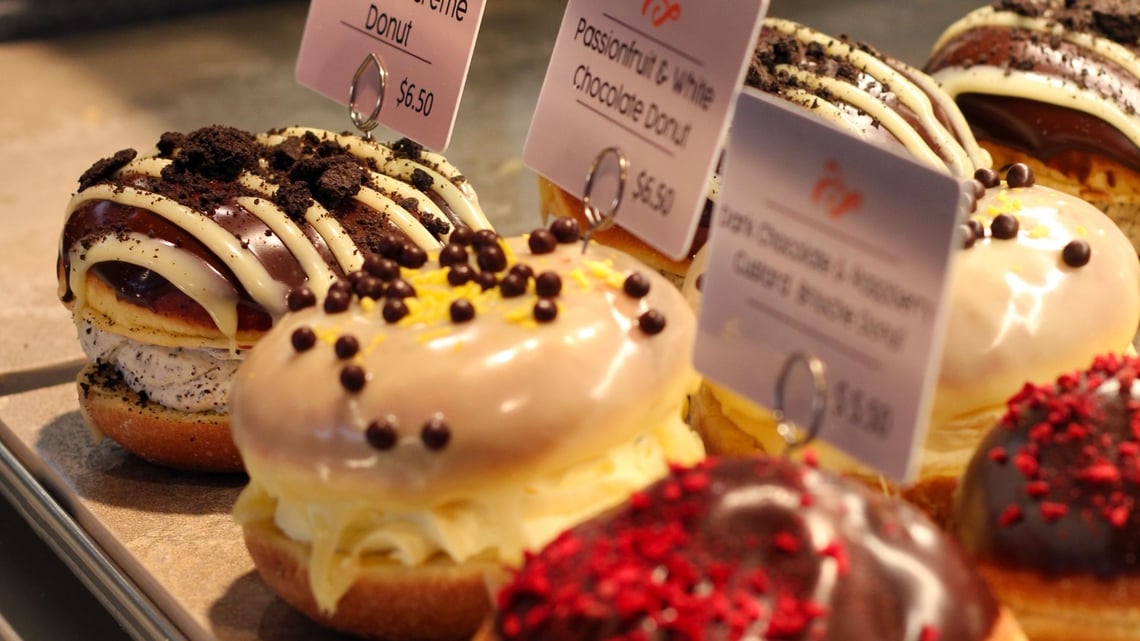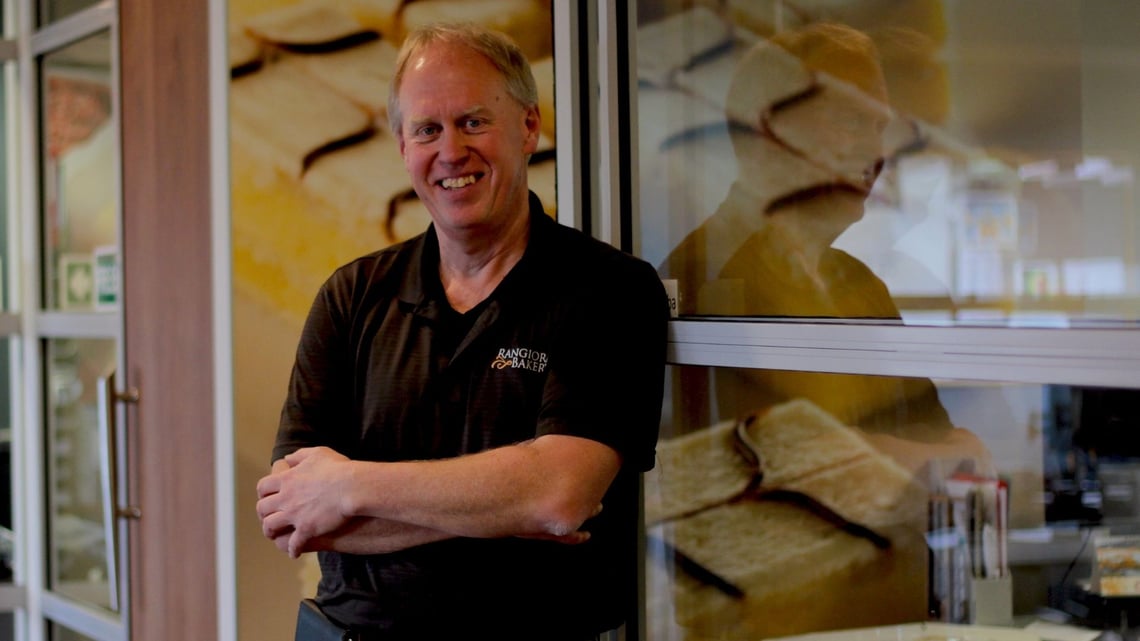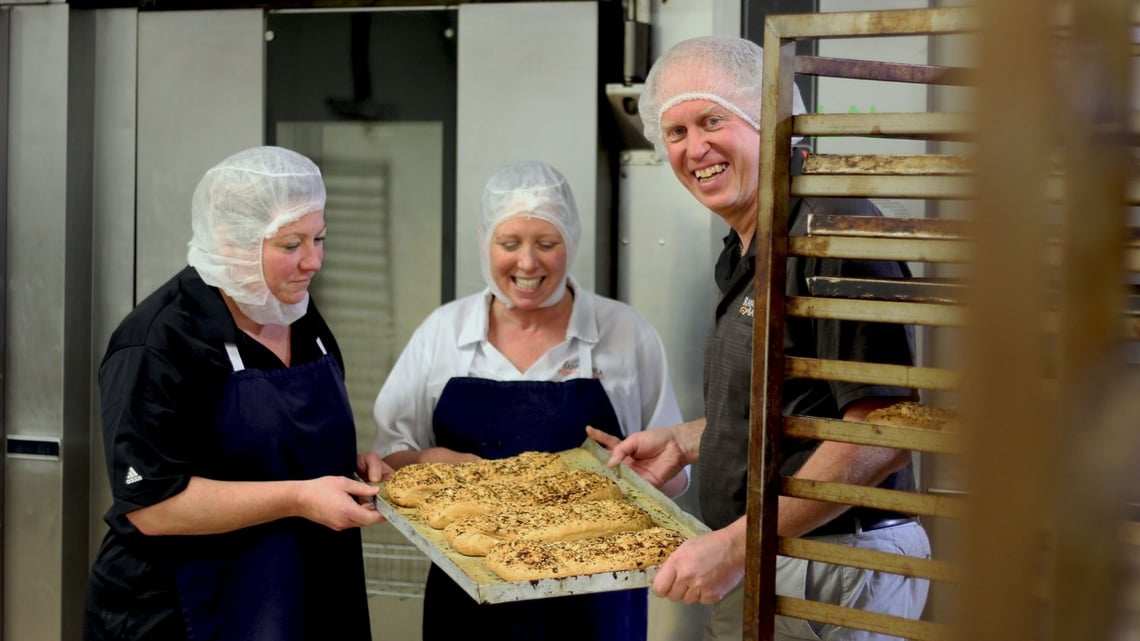Kiwi Business Story: Ron van Til from Rangiora Artisan Cafe and Bakery

Ron van Til is the owner of the iconic Rangiora Artisan Café and Bakery in Waimakariri, north of Christchurch. The bakery and its two-level café have won multiple awards for its products, and the business also serves major corporate clients in New Zealand, Australia and Asia.
Location: Waimakariri, Canterbury
Business Type: Food and Beverage
Founded: 1860. The business has been in the van Til family since 1965
Number of Employees: 140
Current Business Situation: Restructuring and re-establishing business to pre-COVID-19 levels while expanding export opportunities
Relationship with The Icehouse: Owner Manager Programme alumni
“Ron is a continuous coach, empowering everybody around him to excel. He normally does not interfere with decisions other managers make; he allows managers to be entrepreneurial. We do not feel the pressure to keep on running which frees up our mind to be ourselves. He’s a pleasure to work with.” Frank Janssen, General Manager
Tell us about yourself and why you decided to become an entrepreneur?
I have a background in marketing and have worked in various industries, including property. I joined the family business in 1990, taking on the role of Owner from my father, John.
Why did you choose your type of business?
My skills are people-focused and with my background in sales and marketing, and a thorough understanding of the business and its products through my parents, I knew I could add to the business. I had visions of expansion and wanted to work out how to get to the next level.
How have you and your business been impacted by COVID-19?
2020 was shaping up to be our best ever year in terms of profitability and sales. We had landed some exciting overseas contracts, and then everything changed – particular concerning the retail side of the business.
In mid-October we were seeing swings from one end to another. The current turbulence of the Australia ports means we are seeing stock sitting on ships rather than into customer’s DCs so this is resulting in lost sales and customer frustration.
With tourism and airline catering business drying up quickly, you have to address the fact that you’re not going to have as many customers as a result of what’s happened. So you have to reshape your business accordingly.
In the first month or two, we were operating at around 5% of our standard sales levels, so we had to do the right thing and applied for the wage subsidy. We got that, and that essentially kept us afloat and allowed us to keep employing people.
Ultimately, you have to resize your cloth and work out which roles are a ‘luxury’, ‘a nice-to-have’ and a ‘necessity’. As a business, we went through that process very quickly which was really important – resetting the business to a new model.
We calculated that to keep going we had to operate with 25% fewer managers and 25% fewer people – so worked on a 25% principle and created a leaner management structure and merged departments.
What are currently your biggest challenges?
We had no idea what was going to happen at the time of the first lockdown because no-one has ever been through this situation. You spend 30 years in business building up a team around you, and then to have to say goodbye to that is very sad. It’s not only your business that’s affected, but the livelihoods of your team as well.
However, you have two choices. You can either hold on to them – and then you don’t have a business and lose 180 staff, or you have to make those tough decisions and restructure.
I learnt about business resilience after surviving the aftermath of the Christchurch earthquake in 2011, so maybe Canterbury businesses are used to operating in tough conditions.
The fortunate part of the story is that in July, four weeks after we made those incredibly hard decisions, we secured a contract to supply products to a national fuel chain in Australia which runs 450 service stations.
We were able to start employing people again, and suddenly we had this renewed optimism and the capacity to go forward. Through our reputation and working hard on maintaining relationships before and during lockdown, we were able to create those opportunities.
What kind of support have you received from The Icehouse and are you looking to keep working with them?
I went on the Owner Manager Programme in 2007, and I’m able to integrate now what I learned then, because it’s all still so relevant – perhaps now more than ever. OMP encouraged me to alter the way I looked at my business and the way I acted within my business.
You can’t jump in a helicopter and look down at your business and change the culture in your own company, for example. Some things need work. So now I have a much-improved organisational structure and culture, and this is backed up by a low turnover rate.
I have put some of the team through The Icehouse Leadership Development Programme, which has helped them to understand the overarching strategy of the business and the thinking behind those decisions.
How have things changed since working with The Icehouse?
OMP made me look at my business with fresh eyes and get more strategic than I ever had before. You develop a set of skills which enable you to react quicker and be more decisive in your decision-making.
For example, within one week of COVID we were able to thrash out and unanimously agree on the direction we wanted to go in. We literally drew up three strategies on a board, based on predicted sales of either 50%, 60% and 70%, what each of those scenarios was going to look like, what would be our bottom line, and what we needed to make that happen.
That’s something I picked up during OMP. You’ve got to move rapidly but you’ve got to move as a team and you’ve got to move together. If half your employees think you should be moving left, and the other half want to go right, then you’re in trouble.
What advice would you give to other entrepreneurs who are struggling/looking for help?
Don’t let things hold you back and don’t procrastinate. You don’t need to have a long series of meetings to determine your short and long-term strategies and you can always change your thinking halfway through in any crisis. The most important thing is to act as fast as possible, to be flexible, and for everyone to be singing from the same song sheet – otherwise your profitability’s gone and you’ll end up not having a business.

Follow this link for more information about Rangiora Artisan Café and Bakery and its range of products and services.

.jpg?height=500&name=Kiwi%20Business%20Story_Image%20(48).jpg)
